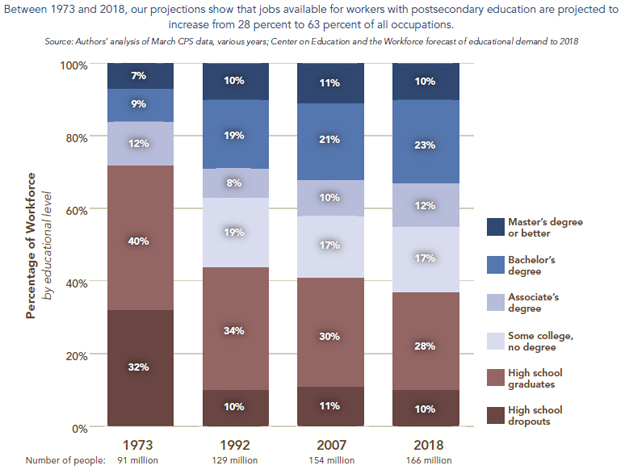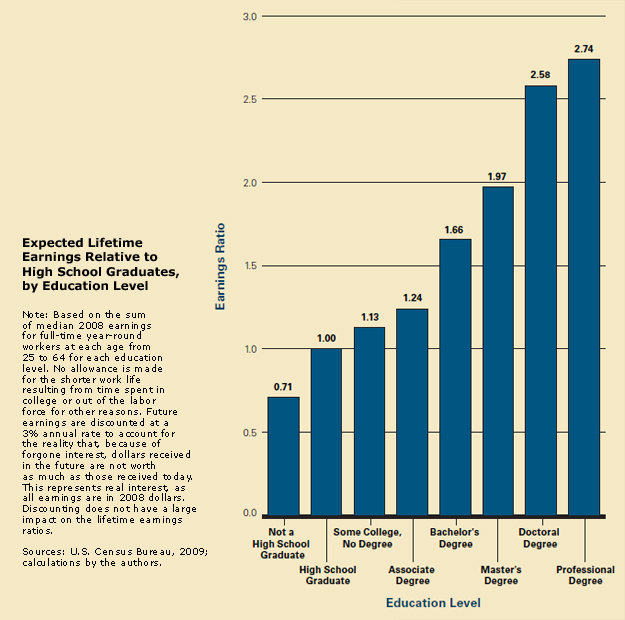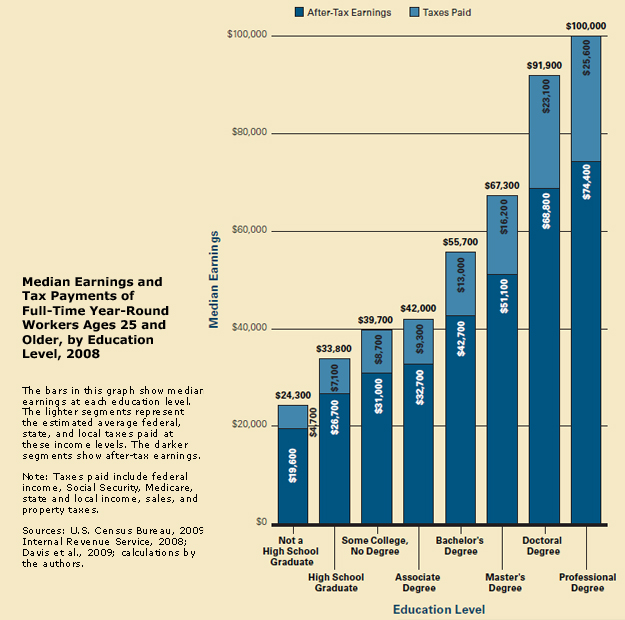Before World War II, only a small proportion of Americans went to college. In 1937, just 15 percent of high school students went on to higher education, and most of them were from upper-income families. After the war, college enrollment surged, due in large part to the GI Bill. But even by 1970, most people were not going to college. They didn't need to. Most jobs didn't require degrees.
Everything has changed. People who don't get some kind of post-secondary education are quickly falling out of the American middle class.
In 1970, only 26 percent of middle-class workers had any kind of education beyond high school. Today, nearly 60 percent of all jobs in the U.S. economy require higher education. The wage gap between people who have bachelor's degrees and people with only a high school diploma has nearly doubled since the early 1980s.
The Rising Value of Education
Educated workers are becoming increasingly valuable for two reasons: Many lower-skilled jobs are being shipped overseas, and computers do much of the mundane, repetitive work now. What's left are more complex tasks that require people to solve problems and work together, according to Tony Carnevale, director of the Georgetown University Center on Education and the Workforce.
"Skills that used to be reserved for senior technical people or managers are more and more required" of everyone, says Carnevale. "It's less a matter of standing in front of a machine and doing the same thing over and over again" and more about "exploiting the machine, interacting with customers and interacting with your co-workers."
As a result, workers across a range of occupations need better communication and problem-solving skills than they used to.
College-educated people not only tend to have higher earnings than people without degrees, they are also more likely to have health and retirement benefits with their jobs, and they are far less likely to be unemployed. And having a degree is not just about economic advantages. People with college degrees are more likely to be satisfied with their jobs. They are more likely to read to their children, which helps their kids be better prepared for school than other children. People with degrees are also healthier.
"A Class Dimension"
The data that supports these findings is summarized in a report put out every three years by the College Board called Education Pays. One of the authors of that report, economist Sandy Baum, says there is substantial evidence that going to college causes people to do better in life. In other words, it's not just that people who go to college are better off or more talented to begin with.
"There's been a lot of testing done, lots of sophisticated statistical analyses," she says, "and they all show that going to college changes you in ways that change the way you behave, the choices that you make. And you become, as a result of that college education, a more productive and better-paid member of the labor force."
Economist Tony Carnevale says something else that people can learn in college is how to interact with other educated people.
"There is a class dimension to this," he says.
People who go to college, especially elite colleges, tend to "come out with a certain amount of polish and understanding about how the world works," he says. This kind of knowledge is valuable in the workplace, and in life, according to Carnevale.
Value in "Some College"
One of the interesting questions about people who go to college but never finish degrees is what, if any, advantages they get from the time they do spend in school.
It turns out you're better off with some college than no college at all — as long as you don't go into too much debt, says economist Sandy Baum. This bar graph demonstrates that people with some college tend to earn more money than people who have just high school diplomas:
Baum says this earnings data suggests people get something from college that gives them a leg-up in the job market even if they never get credentials. But credentials are also clearly important, as this illustration shows:
On average, earnings increase for every degree someone gets, and the jumps are particularly large when people get graduate degrees. A person with a professional degree tends to make nearly twice as much as someone with just a bachelor's degree.
The Stakes are High
The fact that there is such a big payoff for degrees is why there's so much at stake in getting students to finish college, and in encouraging dropouts to come back.
The percentage of Americans who have college degrees has been rising. About 32 percent of people ages 25 to 34 have degrees from four-year colleges, up from 24 percent in the early 1980s. If you look at all adults in America, about 40 percent have some kind of college degree.
But that's not enough, says economist Tony Carnevale. He projects that by the year 2018, the United States will need at least 22 million more people to have college degrees in order to meet the growing demand for educated workers — and at current rates, the nation will fall short. He adds that other countries are now doing a better job getting people to go to college and graduate.
In an increasingly competitive global economy where education matters more than ever, Carnevale says America is falling behind.









